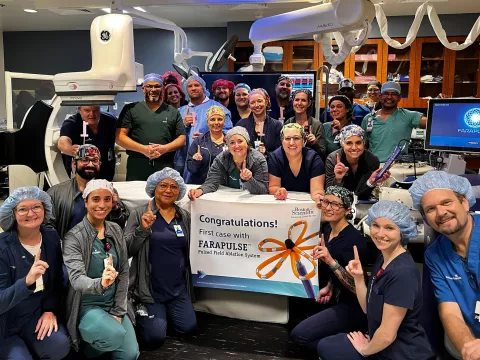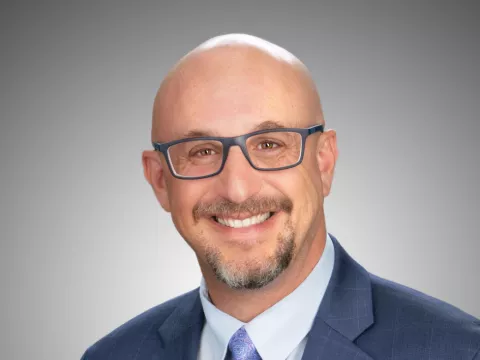- AdventHealth
In January 2024, AdventHealth Celebration neurotologist Michael Seidman, MD, FACS, became the first in Florida and the Southeast to complete a robotics-assisted cochlear implant procedure using the iotaSOFT® Insertion System, the first FDA-authorized technology of its type. Approved for use in patients ages 12 years and older, iotaSOFT® is a robotic-assisted technology designed to aid surgeons in placing cochlear implant electrode arrays into a radiographically normal cochlea by controlling the speed of implant insertion. Studies have shown that reducing and controlling the insertion speed reduces trauma to the cochlea, improving surgical outcomes.

Neurotologist, AdventHealth Celebration
The Challenge — Slowing Insertion Speed to Prevent Residual Hearing Loss
An estimated 6.6 million Americans age 12 and older have severe to profound hearing loss in one or both ears. While hearing aids amplify external sounds, cochlear implants bypass damaged parts of the inner ear and directly stimulate the auditory nerve. They have improved hearing in patients with severe hearing loss for decades. However, most implant recipients experience additional loss of their natural hearing after surgery due to intracochlear trauma that can occur during manual insertion of the electrode array that is implanted in the cochlea.
“The spiral-shaped cochlea is very small, and the tissue is extremely delicate,” explains Dr. Seidman. “No matter how steady a surgeon’s hand, there is movement. Even slight variations can cause damage, negatively impacting the patient’s residual hearing, and we want to preserve as much of their residual hearing as possible. Furthermore, we know that maintaining a slow and consistent speed during insertion of the electrodes decreases force which is critical to minimizing pressure spike fluctuations that can also cause intracochlear structural trauma and hearing loss.”
Improving Cochlear Implant Precision and Outcomes
Robotics-assisted insertion has emerged as a way to reduce variability and standardize electrode insertions across individual surgeons and experience levels. A recent study found that compared with manual insertions, robotics-assisted insertions significantly decreased insertional intracochlear trauma.
Compatible with all three FDA-approved cochlear implant manufacturers, the iotaSOFT® system is comprised of a control console and a patient-mounted robotic drive unit that is the size of a thumb. The technology enables the surgeon to insert the electrode array at slower and more controlled speeds than the human hand — as low as 0.1mm/s. Dr. Seidman will offer this new approach to treat patients with debilitating hearing loss who are candidates for cochlear implants, including those with sensorineural (caused by damage to the inner ear or auditory nerve), noise-induced or genetic hearing loss.
“The beauty of the iotaSOFT® technology is that it allows for slower and steadier insertion,” Dr. Seidman says. “We believe it may improve patient outcomes by minimizing trauma and preserving residual hearing.”
Dr. Seidman and his team at AdventHealth Celebration plan to perform future studies evaluating the auditory outcomes of iotaSOFT® cochlear implant patients.
“As one of the busiest cochlear implant centers in the country, we are committed to providing our patients with the highest quality care and advanced technology, and we have a responsibility to contribute toward the growing field of knowledge on this new robotic approach,” shares Dr. Seidman. “We look forward to future research efforts and know that any improvement in hearing preservation we can achieve for our patients can make a huge difference in their quality of life.”
Recent News
The AdventHealth Neuroscience Institute is the first in Florida and one of the first in the country to begin recruiting patients with primary progressive or non-active secondary progressive multiple...
Discover what’s being accomplished in Central Florida to bridge the health gap with Orange County Mayor Jerry Demings and AdventHealth’s Dr. Alric Simmonds.
Breakthrough device offers new hope for stroke survivors struggling with rehabilitation following ischemic stroke
The Convergent Hybrid Ablation procedure has been gaining acceptance as an effective treatment option for long-standing persistent atrial fibrillation (AFib) since the CONVERGE trial data published in...
Recently, AdventHealth for Children pediatric orthopedic surgeon Sean Keyes, DO, Katelyn Smith, PA-C, and their team performed their 100th bridge-enhanced anterior cruciate ligament (ACL) repair (BEAR...
AdventHealth recently began piloting a new Genomics Risk Assessment for Cancer and Early Detection (GRACE) program that combines the use of digital mammography, artificial intelligence (AI) technology...
AdventHealth Clinical Research Unit (CRU) Executive Director and Medical Director of Genitourinary Oncology Guru Sonpavde, MD, co-authored an article on the AMBASSADOR Phase III clinical trial results...
AdventHealth Research Institute is currently seeking physicians experiencing exhaustion, irritability, hopelessness, anxiety, work/home imbalance or similar burnout symptoms to participate in a...
A promising new treatment for AFib patients called Pulse Field Ablation is first offered in Central Florida at AdventHealth and shows less damage to tissue.
Plastic and Reconstructive Microsurgeon Sabrina Pavri, MD, and Breast Surgeon Devina McCray, MD, recently began offering immediate neurotization after breast reconstruction, a new surgical technique...
Explore the healing power of music for stroke survivors and their families in this episode of the Inspiring Wholeness podcast.
Dr. Andrew Weinfeld will be responsible for executing clinical and organizational strategy, improving clinical effectiveness and patient safety, and delivering exceptional patient experiences for the...












